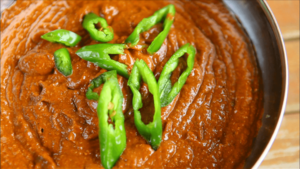Ssamjang facts for kids
 |
|
| Type | Condiment |
|---|---|
| Place of origin | Korea |
| Associated national cuisine | Korean cuisine |
| Main ingredients | Gochujang, doenjang |
| Korean name | |
| Hangul |
쌈장
|
|---|---|
| Hanja |
쌈醬
|
| Revised Romanization | ssamjang |
| McCune–Reischauer | ssamjang |
| IPA | [s͈am.dʑaŋ] |
Ssamjang (Korean: 쌈장) is a delicious, thick, and spicy paste from Korean cuisine. It's often used when you wrap food in a fresh leaf. This special sauce is a type of condiment, which means it adds lots of flavor to your meal.
Ssamjang is made from a mix of tasty ingredients. The main ones are doenjang (a paste from fermented soybeans) and gochujang (a red chili paste). It also includes sesame oil, onion, garlic, green onions, and sometimes a little brown sugar.
Contents
How to Enjoy Ssamjang
Ssamjang is usually eaten with a ssam, which means "wrap" in Korean. People often use it with grilled meats like galbi or samgyeopsal.
Making a Perfect Ssam
Here's how you typically make and eat a ssam:
- First, you take a fresh leaf, like lettuce or perilla, and place it in your open hand.
- Next, you add small, bite-sized pieces of your meal onto the leaf. This might be grilled meat, kimchi, other side dishes called banchan, and sometimes rice.
- Then, you put a dollop of ssamjang on top of everything.
- Finally, you carefully wrap the leaf around all the ingredients.
- Now, you can eat the whole wrapped ssam in one bite!
Ssamjang is also great as a simple dip for fresh vegetables, like peppers.
What Does "Ssamjang" Mean?
The name Ssamjang tells you exactly what it is!
- Ssam means "wrapped" or "to wrap."
- Jang means "paste" or "thick sauce."
So, when you put them together, Ssamjang means "wrapping sauce." It's the perfect name for this popular Korean condiment!
Different Kinds of Ssamjang
While there's a classic way to make ssamjang, people also create special versions. You can even find many types of pre-made ssamjang in stores.
Popular Variations
- Nut Ssamjang (견과류 쌈장): This version has ground nuts like walnuts, pumpkin seeds, and sunflower seeds mixed in. It adds a nice crunch and nutty flavor.
- Tofu Ssamjang (두부 쌈장): Crushed tofu is added to the paste, making it a bit lighter and creamier.
- Flying Fish Roe Ssamjang (날치알 쌈장): Tiny, colorful flying fish roe is mixed into the sauce, giving it a unique texture and taste.
- River Snail Ssamjang (우렁이 쌈장): This type is made by boiling river snails with doenjang, green onion, garlic, and red pepper powder. It's a very traditional and flavorful option.
See also

- In Spanish: Ssamjang para niños
 | May Edward Chinn |
 | Rebecca Cole |
 | Alexa Canady |
 | Dorothy Lavinia Brown |

